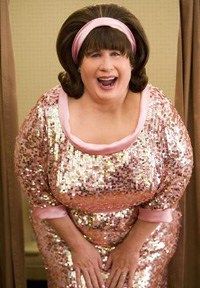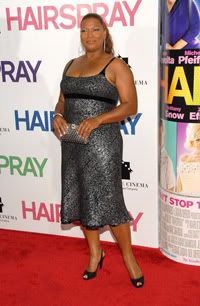 The first time I became aware of the concept of "tweenagers", which is apparently the name for children between infancy and the teens, was when Minima bothered us so much about the DVD for High School Musical that we bought her it, and I've been regretting it ever since. As if that weren't bad enough, Maxima, the turncoat, has come to like the damn thing and, having taken Minima to the third movie, now plans to see it again with her. Infamy, infamy, they've all got it in for me! (Sorry, I don't think it works in a US accent.)
The first time I became aware of the concept of "tweenagers", which is apparently the name for children between infancy and the teens, was when Minima bothered us so much about the DVD for High School Musical that we bought her it, and I've been regretting it ever since. As if that weren't bad enough, Maxima, the turncoat, has come to like the damn thing and, having taken Minima to the third movie, now plans to see it again with her. Infamy, infamy, they've all got it in for me! (Sorry, I don't think it works in a US accent.)So it was with some trepidation that I sat down with Minima to watch the 2007 version of Hairspray, starring John Travolta as the main character played by Divine in the 1988 original.
Although the transvestite actor - real name Harris Glenn Milstead - had shorn much of the camp aggression from his stage persona for the original, I still felt some discomfort at my daughters watching him and perhaps thinking his other films might be "safe". So we got the 2007 DVD and, to my amazement, I saw that there was a difference between this and the High School Musical franchise: this was good.
The songs were great, so much so I wouldn't object to Minima getting the album and playing it every hour that God sends, as she does at the moment with the HSM soundtracks. (Although the chorus of Welcome to the Sixties reminded me slightly of that of Heatwave, sung in 1965 by Martha Reeves and the Vandellas.)
The plot of Hairspray is far more complex than that of the typical fare served up for tweenies. First of all there's the standard girl-falls-for-boy mechanism, but the movie - like the original and the stage play - also deals with discrimination. There's racial discrimination, which is at the centre of the film; the struggle to desegregate a teen dance show hosted by Corny Collins, a local celebrity who also opposes segregation on the basis of race but is opposed by former Miss Baltimore, Velma von Tussle (Michelle Pfeifer), an out-and-out racist who opposes integration, and is determined to experience her ambitions vicariously in the dancing career of her spoilt daughter Amber.
The film gave me an opportunity to relate to the girls a story my Mum told me about when she was living in New York in around the same time as the film is set. She was in Woolworths and went to the restaurant; one part being packed, she went to the emptier section - and was told to move, as this was reserved for coloured people. I don't know if this was before or after an incident on 1960 when four black people - Franklin McCain, David Richmond, Joseph McNeil and Ezell Blair - ordered coffee in the same restaurant at 4pm and remained unserved until it closed at 5pm. This developed into a sit-in and, although there were attacks on the protesters, they stayed true to Martin Luther King's doctrine of non-violent protest.
 There was also a sub-plot concerning discrimination on the grounds of obesity. John Travolta wore a fat-suit for the film to play protagonist Tracy's mother, who I gather lost her figure after having Tracy. Travolta brings all his considerable acting talent to the fore to make his character believable, but the thing is, I don't think the characters of Edna and Tracy Turnblad are all that fat.
There was also a sub-plot concerning discrimination on the grounds of obesity. John Travolta wore a fat-suit for the film to play protagonist Tracy's mother, who I gather lost her figure after having Tracy. Travolta brings all his considerable acting talent to the fore to make his character believable, but the thing is, I don't think the characters of Edna and Tracy Turnblad are all that fat.Possibly my own girth plays a part in this judgement - I remember a job on buses that were converted into moving hospital wards where I was once referred to as "the wee thin guy from Glasgow", but that was many years ago. When Maxima put on a few pounds after having the girls, I came out in sympathy. Big time.
Or maybe US singer/songwriter John Mellencamp got it right when he said on Bob Harris' country show on BBC Radio 2 that the first time he came to Great Britain, he thought the people looked fitter, then added "now you all look like us".
Mellencamp was on the show to promote his new album, Life, Death, Love and Freedom. One of the songs on it is called Jena, after a town in Louisiana where in 2006 racial tensions at a secondary school spilled over when empty nooses were hung from a tree, a situation which culminated in a group of black youths being charged with assaulting a white youth. I looked it up on Wikipedia and just got more confused, although last year Townhall's Larry Elder tried to unravel what was going on.
In the UK, we had the awful murder of Stephen Lawrence by a group of white teenagers in 1993, regarding which nobody has been successfully prosecuted. At the time the Daily Mail took the unusual step of accusing five teenagers of the murder before any prosecution, including the Acourt brothers - which may have contributed to their acquittal. The subsequent investigation into the incident and its investigation, chaired by retired High Court Judge Sir William MacPherson, led to the production of a report which claimed to identify a culture of institutional racism in the Metropolitan Police Force (the "Met") which polices London and whose Commissioner is the most senior police officer in Britain.
In a recent letter to the Spectator, however, Norman Dennis, Director of Community Studies of the think-tank Civitas, criticised the "uncritical reception" of the report and it's "pernicious influence on policing". There certainly appears to be a "civil war" based on race lines at the Met right now, with Assistant Commissioner Tarique Ghaffur having been suspended after he accused the Commissioner, Sir Ian Blair, of racism in a press conference; Commander Dr Ali Dizaei has also been suspended while several claims against him are investigated.
After Dr Dizaei's suspension, the Metropolitan Black Police Association severed links with senior managers, and as London's Mayor Boris Johnson launches an enquiry into racism in the force, the MBPA stated it would no longer be encouraging black and Asian people to join the Met. It's a shame to see it opposing the Met in this way, and a greater shame that if you are white and heterosexual in certain settings, then you have nobody to speak for you.
One thing the MacPherson Report stated was that the approach of affecting to be "colour blind" was "flawed". Which brings me back to Hairspray, in particular a line sung by Tracy's friend Seaweed in Run and Tell That:
I can't seeIt was good to see that the concept of the "melting pot" is fading from the minds of both judges and lyricists. It's still present in education, however, so perhaps it's not as surprising as it is depressing to see a statement on the MBPA website informing the world that the old socialist concept of being "politically black" is still alive and well: "The term black does not relate to skin colour but is used to describe all people of African, African Caribbean or Asian origin."
Why people look at me
And only see the color of my face
yes they do
And then there's those
That try to help, god knows
But have to always put me in my place
Now I won't ask you to be color blind...
Eh? So are/were Freddy Mercury, Ian Smith, Kim Jong-Il, Deng Xiaoping and the Dalai Lama black? Clarence Sholé Johnson, Professor of Philosophy in the Middle Tennessee State University, summarises the concept in an essay entitled (Re)Conceptualising Blackness and Making Race Obsolescent:
there is no incongruity in the idea of a person being pigmentationally white and politically black, or of a person being pigmentationally black and politically white. All that it means to say that a person is politically black is that the person is anti-status quo; that she or he is ideologically committed to de-centering whiteness; that she or he is oppositional or counterhegemonic.I'm reminded of Barack Obama's claim to be moving towards post-racial politics, but he was monumentally undermined by some of his supporters who called him a lightworker -
 somebody who can "usher in a new way of being on the planet", seemingly because they can't conceive that an ordinary black bloke could run for President.
somebody who can "usher in a new way of being on the planet", seemingly because they can't conceive that an ordinary black bloke could run for President.Anyway, as Seaweed's Mum (Queen Latifah) states in the show-stopping spectacular finale, "it's time to wrap this mutha up!" It's good to see that such rich seams of discussion can be mined through watching Hairspray, as well as having a thoroughly good time. Hilarity is a wonderful initial strategy to disarm discrimination, far better than a thousand sociopathic soap-operas; and if Minima and Minora accuse me of going against the grain of received opinion that being equal is equivalent to being the same, well then, "Tosh!" I shall reply - "in my counterhegemonic stance I'm just being politically black." Or is that ideologically obese?











I think you're right that racism is now more subtle than ever, and not confined to discrimination towards black people by whites. (For example, over here, political journalist Jeremy Paxman was lambasted for saying that it was very difficult for a whte man to get very high up in the BBC.)
ReplyDeleteI'll gladly join in the Rosary Novena - is this the one you're thinking of?
http://unbornwordoftheday.com/2008/10/25/rosary-novena-to-our-lady-of-victory-october-27th-to-election-day-november-4th/
Regards - FD
Thanks for the comment, Frank. Sorry it took so long to get abck to you, my computer caught a cold.
ReplyDeleteI feel no guilt or shame. In fact, in the body of this post about racism, I mention "white" only three times:
1 - "a group of black youths being charged with assaulting a white youth" [in Jena].
2 - "the awful murder of Stephen Lawrence by a group of white teenagers in 1993".
And the third is the one you mention. I agree with Professor Steve Jones (author of The Language of the Genes) that race is nothing more than a societally-determined construct based on colour of skin. Culture is much more important - there's a world of difference between a Kenyan animist and the Christians next door, even though both may be black.
I'm glad that Muslim barrister Saleca Faisal Parkar won her discrimination case brought because of the shocking abuse she was subjected to on the grounds of race and gender, and at the same time I recognise that many people may not be as pleased as perhaps they should be for her because of the shadow cast upon Islam by the acts of many of her co-religionists.
You criticise the notion of being "politically black": if you reread the post, so do I.
All the best
FD
'I feel no guilt or shame.' It's impossible to prove a negative.
ReplyDeleteThanks for the comment, Frank, but I'm a bit puzzled by it - how can I present proof as to what I feel, whether it be positive or negative? FD
ReplyDelete